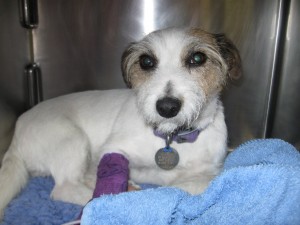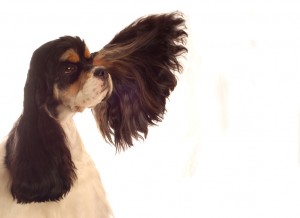An article on a report published by the Australian Pesticides and Veterinary Medicines Authority (AVPMA) in the Canberra Times today magnifies adverse effects in some animals to veterinary vaccines, flea treatments and other chemicals. It fails to mention the sickness, suffering and death prevented by these treatments in the vast majority of animals.
This morning we admitted an unvaccinated pup into hospital with parvovirus gastroenteritis. He is very dehydrated and is suffering severe abdominal pain. His chances of survival are 60:40. If he had been vaccinated he would not have developed this nasty disease. The vaccine is close to 100% effective in preventing parvovirus disease and only has to be administered once very 3 years to adult dogs.
Many hundreds of thousands of dogs are vaccinated every year and only a handful suffer any side effects. Most often the side effects are mild, a swelling at the site or of the face.
This summer is the wo rst for fleas and ticks in many years because of the high rainfall. Tick antiserum is in short supply and it is imperative that all dogs travelling to the coast are treated with a tick preventative and searched daily for ticks.
rst for fleas and ticks in many years because of the high rainfall. Tick antiserum is in short supply and it is imperative that all dogs travelling to the coast are treated with a tick preventative and searched daily for ticks.
Advantix, permethrin spray and Frontline are the most effective tick prevention available. Compared to the number of dogs treated we see very few side effects. They are usually mild skin irritation or hair loss, and usually reversible.
Dogs infested with ticks die without tick antiserum and intensive treatment. Tick antiserum is far more likely to cause serious side effects than any of the preventative chemicals. Tick prevention is far better than cure.
Fleas and flea allergy dermatitis cause far more discomfort in far more dogs than the occasional side effect to any of the flea preventatives. Millions of doses of fipronil, imidacloprid and permethrin are applied every year but, as the APVMA reports, only a few cause side effects. The benefits of flea prevention far outweigh the risk of side effects.
Each individual cat should have a tailored vaccination programme. Specialists from around the world debated the frequency of immunisation in cats at this year’s veterinary immunology conference. Factors affecting our recommendation for your cat include whether she goes outdoors or to boarding catteries, or how many other cats live in the household. We have not seen significant adverse effects to the vaccines in any of our patients but we often see very sick unvaccinated cats.
Feline AIDS caused by the cat immunodeficiency virus circulates in our outdoor cat population. It is incurable and reduces affected cats’ ability to fight off common infections and afflictions. We see fever in the occasional cat on the day following the AIDS vaccination.
We see unexpected but occasional side effects with many things we give our pets. This article exaggerates the APVMA’s report and the likelihood of serious problems If you have concerns about any treatments you currently use please discuss the costs and benefits with your veterinarian first.
 Protect family and pets with a solar powered snake repeller. Makers of the Sentinel snake repeller claim that it repels all snake species and is safe to use around children and animals.
Protect family and pets with a solar powered snake repeller. Makers of the Sentinel snake repeller claim that it repels all snake species and is safe to use around children and animals.
 We have a
We have a  rst for fleas and ticks in many years because of the high rainfall.
rst for fleas and ticks in many years because of the high rainfall. 

 Ear infections are very common in dogs, especially breeds with long or hair ear canals like Poodles, Cocker Spaniels and Golden Retrievers. Often they are the first or only sign of doggy hayfever (also known as atopy). Sometimes the infection is secondary to a grass seed.
Ear infections are very common in dogs, especially breeds with long or hair ear canals like Poodles, Cocker Spaniels and Golden Retrievers. Often they are the first or only sign of doggy hayfever (also known as atopy). Sometimes the infection is secondary to a grass seed. We have seen an upsurge in dogs with sun induced skin cancers in the last month or so. Most of these are on the bellies of Staffies or Jack Russells that love to lie on their backs in the sun.These cancers can be difficult to remove completely if they are not caught early and will recur if the sunbaking continues.
We have seen an upsurge in dogs with sun induced skin cancers in the last month or so. Most of these are on the bellies of Staffies or Jack Russells that love to lie on their backs in the sun.These cancers can be difficult to remove completely if they are not caught early and will recur if the sunbaking continues.


 Dogs with Geriatric Vestibular Disease have a head tilt, walk in circles, fall to one side, appear disoriented and are reluctant to stand up. Some also have flicking eye movements, known as nystagmus. Many dogs feel nauseous and vomit.
Dogs with Geriatric Vestibular Disease have a head tilt, walk in circles, fall to one side, appear disoriented and are reluctant to stand up. Some also have flicking eye movements, known as nystagmus. Many dogs feel nauseous and vomit.